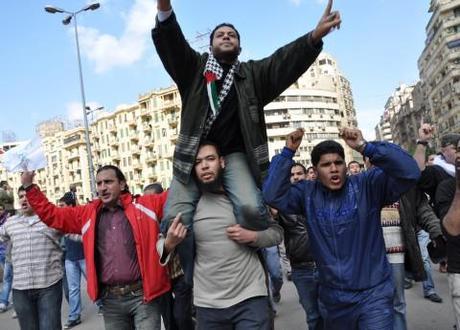
Anti-Mubarak protesters in Tahrir Square, Cairo, Jan. 30, 2011. Photo credit: Floris Van Cauwelaert
Clashes between demonstrators and security forces in Tahrir Square, Egypt, escalated and turned bloody over the weekend as Egyptians took to the streets to voice their increasing frustration with the governing Supreme Council of the Armed Forces’ (SCAF) seeming refusal to loosen its vice-like grip on power in the post-Mubarak era.
The BBC reported that “at least” 13 people died and hundreds were injured over the weekend as troops launched a major assault to clear the square of protesters. Stones and petrol bombs were thrown at armoured personnel carriers and police, who responded with tear gas and rubber bullets. Violence has also reupted in other Egyptian cities including Alexandria, Suez and Aswan.
The spark that has lit the latest protest is a SCAF draft constitution, which protesters insist would, if rubber-stamped, allow the military to retain too much power after a new civilian government is elected. Under the draft, there will be no presidential elections until late 2012 or early 2013 and the military and its budget could be exempted from civilian oversight.
Staggered parliamentary elections are due to begin later this month but observers suggest that they could be postponed due to developments in Tahrir Square. Violence in Egypt this weekend is of “great concern”, British Foreign Secretary William Hague told BBC Radio 4. Warning that Britain would not “take sides on the intricacies of Egyptian politics”, he said: “It’s very important that elections take place.”
Opposition to military uniting. Writing at The New York Times, David D. Kirkpatrick and Liam Stack described “the outpouring of anger was the strongest rebuke yet with the military’s attempts to grant itself permanent governmental powers. And it was a reuniting of Islamist and liberal protest movements that had drifted apart since the early days of the uprising.” The writers insisted that the Tahrir Square stand-off is hugely significant given the square is “the iconic center of Egyptian revolution and the Arab Spring” and said that numbers had swelled as news spread of the military’s heavy-handed response to initially peaceful protests: “Unlike at many of the street protests, in Cairo young women in western as well as Islamic dress and older people joined the throngs of young men, just as they did during the uprising.”
“Imagine those people who died. You go out and protest and beat Mubarak and you think that’s it. And then the next lot kill you anyway”, tweeted Archie Bland of The Independent. “What’s happening in Tahrir Square right now so ugly. Feels like it will shift calculus in Egypt. Any remnants of faith in army must be gone.”
Egyptians’ grim mood. Writing shortly before this weekend’s bloody clashes, The Economist painted a bleak picture of life in post-Mubarak Egypt. The magazine said there is a “growing public irritation at remaining under the thumb of an army that repeatedly promised to surrender power to an elected civilian government but that keeps finding excuses to linger, while trying civilians in military courts – more than 12,000 so far.” “Many Egyptians are in a grim mood”, sighed The Economist, which said that “the economy is sinking into an ever-deeper mess. Military rulers appear incompetent, out of touch and violently reactionary, while civilian politicians bicker and appear increasingly polarised between Islamists and secularists.” The magazine laid much of the blame for the current crisis at the door of the military, which has proved itself to be “not particularly interested in democracy and rather keen on ensuring its own dominance.”
Arab Spring: Better, freer future not inevitable. In an editorial, The Daily Telegraph argued that the “early flowerings” of democratic reform are “beginning to be bitten by the frosts of realpolitik.” The newspaper suggested that few should be overly surprised by the “slow pace” of reform in post-Mubarak Egypt: “It was always an odd sort of revolution that removed a civilian president (albeit one installed by the military) and replaced him with men in uniform.” The paper reminded that next week’s parliamentary elections are supposed to herald a new beginning for Egypt after decades of authoritarian rule but predicted that, if the unrest continues, SCAF might use it as an excuse to postpone the poll, “especially if there is any sign that Islamist extremists are stirring up the crowds.” The Arab Spring has “has offered hope to millions of a better, freer, future. But we should be under no illusion that such a future is the inevitable outcome”, concluded The Daily Telegraph.

